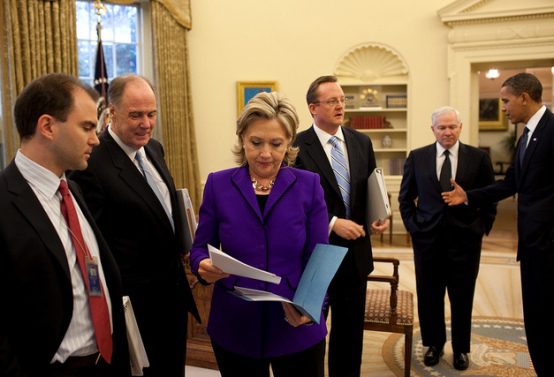The economic “surge” in Haiti…
Kelley Vlahos and Justin Raimondo (among others) have done a great job in pointing to the way the figures measuring the effects of the surge are being exploited by Bush, McCain and other members of the pro-war coalition. As Juan Cole and others have maintained, the relative reduction in violence in Baghdad and some parts of Iraq was achieved thanks to the ad-hoc deals the U.S. has made with leaders of Sunni tribes and ex-Sunni terrorists and the “success” of the process of ethnic cleansing as well as Iran’s diplomatic mediation between Maliki’s government and al-Sadr and the deployment of more U.S. troops.
As I suggested early last year
But what diplomatic or military actions can the Bush administration take in the next 600 days that would reverse the balance of power in favor of the United States and its allies? A U.S. military victory in Iraq is clearly not a realistic option, so one can expect more orchestration of “turning points” as the Bush administration spins the reduction of violence here or the killing of more insurgents there as signs of “progress” that supposedly demonstrate “success” of the surge and therefore require the American public to show even more “patience and resolve.” The standards for measuring success in Iraq have become so low that if Iraq does not break into pieces before a new president comes to Washington, it could be spun by Bush and his aides as a “historic” achievement.
In fact, as I pointed out in another analysis, “The Democrats seemed to have failed to mount a serious challenge to Petraeus and allowed him, and by extension the Bush administration, to set the terms of the current debate on Iraq.” In a way, much of what Bush has been doing since November 2006, in the aftermath of an election whose outcome reflected the support of most Americans to withdrawing the then 130,000 troops in Iraq seemed to be counterintuitive: Add more troops in Iraq. But there has been a logical spin behind the madness. It provided Bush (and McCain) with an opportunity to hail the withdrawal of those additional toops on the eve of the presidential elections as a “success” as it creates a certain sense of relief among Americans. We are withdrawing some troops after all!
But to understand the way the spinning of the Surge has been so successful, we should recall this golden oldie from The Onion (June 23, 2004)
Coalition: Vast Majority Of Iraqis Still Alive
BAGHDAD—As the Coalition Provisional Authority prepares to hand power over to an Iraqi-led interim government on June 30, CPA administrator L. Paul Bremer publicly touted the success of Operation Iraqi Freedom.
“As the Coalition’s rule draws to a close, the numbers show that we have an awful lot to be proud of,” Bremer said Tuesday. “As anyone who’s taken a minute and actually looked at the figures can tell you, the vast majority of Iraqis are still alive—as many as 99 percent. While 10,000 or so Iraqi civilians have been killed, pretty much everyone is not dead.” (Read the rest)
Indeed, it’s in the context of the lowering of the standards to measure success in Iraq that the Bush administration and its supporters plus the “useful idiots” have been able to tout the Surge as a “success,” if not an astounding military victory. Which brings us to the recent glowing report of the IMF about Haiti’s Economic, Political Turnaround. This is a country where 76 percent of the population live on less than US$2 a day. But when you start from very low-point the political and economic scales, even a few minor upward improvements look like a “turnaround” or, indeed, a political and ecomic Surge. It’s as though a parent would be bragging about his kid’s “success” at school: “You should have seen my kid’s report card last year. It was all F’s. So we hired a tutor this year, and we are proud to announce that our son got two D’s.”
The benchmarks to measure success in Iraq should be the ones that Bush, McCain and the other cheer-leaders had provided before Congress authorized Bush to go to war. That should be the context for the debate on Iraq during this election:
1. We would discover weapons of mass destruction in Iraq.
2. We would uncover the ties between Saddam Hussein and Osama bin Ladin.
3. The war in Iraq would be as short and relatively costless in terms of American lives and U.S. dollars as the war in Afghanistan.
4. “Liberated” Iraq would be a unified nation-state and free of ethnic and religious rivalries as well as of foreign occupation.
5. A democratic and secular Iraq would become a political model for the entire Broader Middle East and would create the conditions for a political and economic liberalization in the Arab world.
6. Iraq would not require American economic assistance since it economy would grow and the country would become prosperous thanks to its growing oil revenues.
7. The U.S. military victory in Iraq would strengthen U.S. strategic position in the Middle East
(a) encouraging other global and regional powers to jump on the American bandwagon,
(b) weakening the power of anti-Americans governments (Iran) and terrorist groups,
(c) helping revive the Palestinian-Israeli peace process (“The road to Jerusalem leads through Baghdad”),
and (d) putting pressure on North Korea and Iran to end their nuclear military programs.
Now…based on these high standards set-up by the Bush Administration, it has failed in achieving all these seven goals (and related others). Seven F’s. Time to switch that kid to another school.
